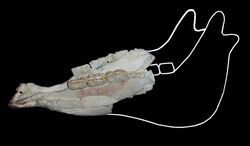Biology:Nannippus
From HandWiki
Short description: Extinct genus of mammals
| Nannippus Temporal range: late Miocene-Pliocene
| |
|---|---|

| |
| Jaw of Nannippus | |
| Scientific classification | |
| Kingdom: | Animalia |
| Phylum: | Chordata |
| Class: | Mammalia |
| Order: | Perissodactyla |
| Family: | Equidae |
| Subfamily: | Equinae |
| Tribe: | †Hipparionini |
| Genus: | †Nannippus |
Nannippus is an extinct genus of three-toed horse endemic to North America during the Miocene through Pliocene, about 13.3—3.3 million years ago (Mya), living around 11.1 million years.
Nannippus lived as far south as central Mexico (N. peninsulatus) to as far north as Canada (N. lenticularis), to California in the west, and North Carolina (N. lenticularis) and Florida (N. peninsulatus) in the east.
Species
- N. aztecus (Mooser 1968).[1] Widespread in Florida and also found in Texas, Oklahoma, and Chihuahua, became extinct 11.2—5.7 Mya.
- N. beckensis (Dalquest and Donovan, 1973)[2] found in Texas only and became extinct about 3.4 Mya.
- N. lenticularis (Cope, 1893) was found in Alberta, Canada, North Carolina, Alabama, Nebraska, and Kansas , becoming extinct about 13 Mya.
- N. montezumae (Leidy, 1882)
- N. morgani (Hulbert, 1993) is restricted to Florida[3] and appears to have become extinct about 8.6 Mya.
- N. peninsulatus (Cope, 1893) was found in Florida, Texas, Oklahoma, New Mexico, Arizona, and Mexico, becoming extinct about 3.3 Mya.
- N. parvulus (Marsh, 1868)
- N. westoni (Simpson, 1930) is restricted to Florida[4] and became extinct about 9.1—8.7 Mya.
References
- ↑ E. H. Sellards. 1916. Fossil vertebrates from Florida: A new Miocene fauna; new Pliocene species; the Pleistocene fauna. Florida State Geological Survey Annual Report 8:79-119
- ↑ W. W. Dalquest and T. J. Donovan (1973). "A new three-toed horse (Nannippus) from the late Pliocene of Scurry County, Texas". Journal of Paleontology 47 (1): 34–45.
- ↑ R. C. Hulbert. 1993. Journal of Vertebrate Paleontology[full citation needed]
- ↑ G. G. Simpson. 1930. Bulletin of the American Museum of Natural History 59(3)
Wikidata ☰ Q3870141 entry
